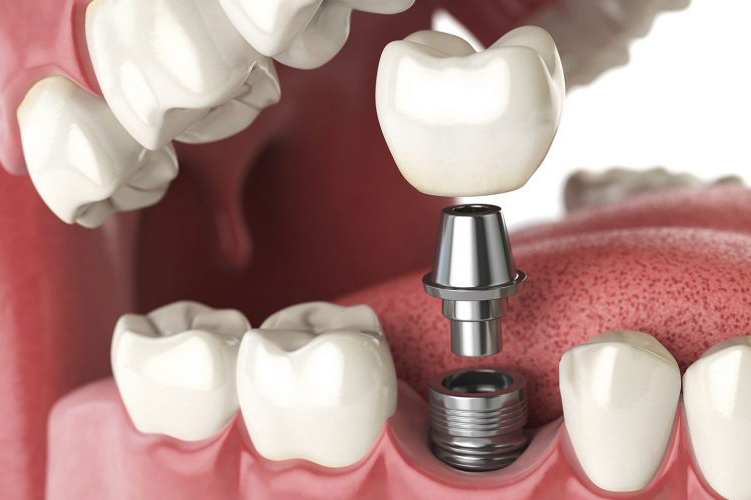
Implant Treatment
Implants are artificial tooth roots placed in the jawbone and made to support dentures. Fixed or removable dentures made on these artificial roots, which are made to replace missing teeth and can be used for a lifetime, fulfill the chewing function and aesthetics of the patient. Dental implants are made with the help of screws or screws placed in the jaw to complete the missing tooth or teeth in the mouth. The missing teeth are placed on these screws. Implants can be applied for a single tooth or can be used in long tooth gaps. The strength of the person’s bone structure and gum health are effective in the success of implant treatment.
In Which Cases Is Implant Treatment Applied?
In cases where there are no teeth in the lower and upper jaws, in cases where the patient cannot use their full dentures due to excessive bone loss, the dentures are placed on the implants and retention is increased.
If the back region ends without teeth in the loss of molars, a fixed bridge can be made on several implants instead of a partial denture that can be attached and removed.
In long toothless gaps, the long bodies of the bridges made cause problems. The support and durability of long bridges can be increased with one or more implants to be applied to the toothless area.
In the event of a single tooth loss, a single implant can be placed in place of the missing tooth without the need to reduce the teeth on both sides of the lost tooth and a single coating can be made on it.
What are the situations in which implantation is not possible?
Implantation may be inconvenient due to some physical disorders or disabilities. These situations can be listed as follows;
Some heart diseases
Blood clotting problems
Rheumatic diseases
Diabetes; cases where it is not under control and diabetes does not progress regularly
The bone structure in the jaw is not suitable, insufficient and anatomically risky
The patient is not prone to surgical procedures (excessive anxiety, excessive fear)
Cases where the patient cannot fully clean the mouth after the implant
What is Implant Treatment?
Implants are artificial tooth roots placed in the jaw bone and made to support the prostheses. Fixed or removable prostheses made on these artificial roots, which are made in place of missing teeth and can be used for a lifetime, restore the chewing function and aesthetics of the patient
What to Consider Before Getting a Dental Implant?
An implant is an artificial tooth root placed in the jawbone to restore the function and aesthetics of missing teeth. Implant screws are structures with a certain thickness and width. Therefore, in the area where the implant is planned to be placed, the jawbone must have the height and width to accept this implant screw.
The quality of the bone is also one of the factors affecting implant success. In addition, the gums must be completely healthy before treatment and as long as the implant remains in the mouth.
One of the most important factors that is important in implant application and affects success is the bone structure. The person must have a suitable bone tissue for the implant. The bone tissue must be determined and then the implant planning must be done. Clinical and radiological examinations must be performed before implant application.
If the person’s bone structure and general health are suitable for implants, there is no upper age limit. Health is a much more important factor than age. Implant application is not preferred only in very young patients whose bone development has not yet been completed.
The implant period may vary depending on the number of teeth to be applied. Today, with the developing technology, treatments are completed in a very short time. The pain after the implant placement is no different from the pain felt after a normal tooth extraction.
In cases where the treatment is completed without any problems, patients are so comfortable that they do not even feel the presence of the implants. General or local anesthesia can be used during the implant application according to the patient’s preference.
Before implant treatment and as long as the implant remains in the mouth, the gums must be healthy. In order to ensure complete union of the implants with the bone (osteointegration), the loads on the implant must be minimized during the first 3-6 months of the healing period.
Especially during early healing, smoking can increase the risk of infection. For this reason, smoking is not recommended.
The life of implants depends on many factors. Implants can be used for a lifetime if the patient provides general oral and dental care and protects their health. In terms of the life of the implant, it is necessary to brush the teeth twice a day correctly, use dental floss and mouthwash regularly.
Implants are made of materials that have no side effects on the body and have been subject to intensive research for years. These are usually metals such as titanium and other similar substances that are never part of a living organism. Therefore, the body cannot produce antigens against them and reject the implant as it does in heart and kidney transplants.
The experience of the doctor who will perform the implant is very important. It should be ensured that the dentist is educated and experienced in the field. If the decision to implant is made, a good research should be done on this subject and the right doctor should be found.

